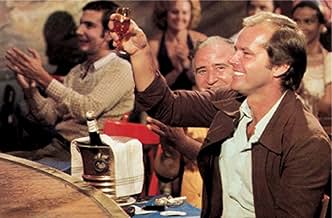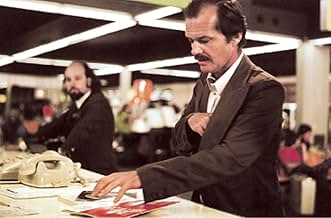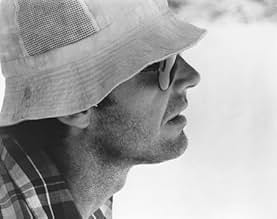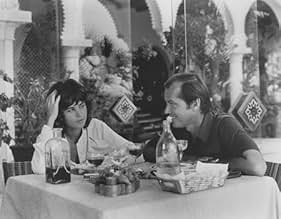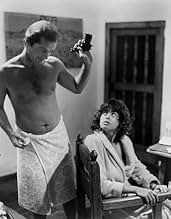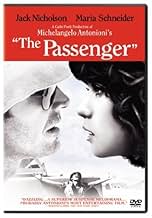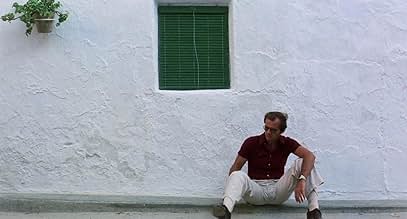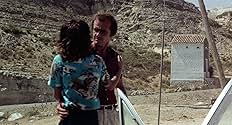Un giornalista frustrato in cerca di libertà assume l'identità di un uomo morto, che si rivela essere un trafficante d'armi.Un giornalista frustrato in cerca di libertà assume l'identità di un uomo morto, che si rivela essere un trafficante d'armi.Un giornalista frustrato in cerca di libertà assume l'identità di un uomo morto, che si rivela essere un trafficante d'armi.
- Regia
- Sceneggiatura
- Star
- Premi
- 5 vittorie e 2 candidature totali
- Robertson
- (as Chuck Mulvehill)
- Hotel Clerk
- (non citato nei titoli originali)
- Murderer's accomplice
- (non citato nei titoli originali)
- Cameraman
- (non citato nei titoli originali)
Recensioni in evidenza
"Professione: reporter", to me, belongs to the most interesting period of Antonioni's career (between the second half of the Sixties and the first of the Seventies). Because in these years the Italian director made his most accessible works: "Blow Up" (1966), "Zabryskie point" (1969) and "Professione: reporter" ("The Passenger", 1974). These films contain more action and more situations. They are neither more commercial nor more mainstream, but they talk about an adventure or a dream.
A journalist in North Africa switches the identity with a dead man who looks like him. He does this to escape from his life and for living a more interesting one. But he'll pay for his choice...
It's difficult to say, but this Antonioni movie (with his recurrent themes and -in a smaller way- times) has a lot of suspense, if I can say so. Once you begin to watch it, you can't give up. The funny thing is that nothing really big or special happens: sometimes it seems a road movie, sometimes it is a typical Antonioni analysis of the society. Jack Nicholson -how young he was at that time!- fills the film, his performance and his expressions are brilliant. It's also interesting the chemistry with Maria Schneider, the lady of "The last tango in Paris" -an actress who never got the fame and the recognition she deserved.
Cinematography is fantastic. But, above all, the big surprise of the film is the final shot: a 7-8 minutes take without cuts, absolute amazing. It's not describable, it's a must!
Despite its power and polemic against journalism, Professione: Reporter is also an understated movie from start to finish, made for a grown-up audience. Nothing is spelt out for you. However, the movie is strewn throughout with powerful and evocative visual clues, so it's nonetheless up to you as an attentive viewer to pick up (the early scene of Locke's Jeep getting stuck in the African desert sand, anyone?), or even soak them up unconsciously. As with all Antonioni, every shot in this movie is worthy of analysis and admiration. Bergman once said about the Italian that he could create some arresting individual images, but was incapable of stringing them all together in the sequence of a palatable movie: sorry Ingmar, old man - as much as I feel in awe of your craft, you're talking nonsense, here. However, I can't believe Antonioni once had the cheek to say he improvises each scene as he goes along (see his IMDb quotes page). There isn't a chance in hell these meticulously crafted, immaculately framed and composed movies are not also carefully premeditated. Clearly, Antonioni was trying to start a myth about himself along the lines of the one about Mozart composing his music straight onto the page, as dictated by God. In Professione: Reporter, I was especially in awe of the sequence involving the single long take from the window of Locke's last hotel room in an unnamed, dusty Spanish village. Regarding Maria Schneider, it truly is a shame she wasn't the star in a greater number of successful movies. Her ambiguity makes it very difficult to keep one's eyes off her when she's on screen. She looks like a cross between a boy, a girl and something cutely ape-like (I mean it in a good way!).
I would like to warn viewers of the inclusion of footage of a real execution - again, this was a film within the film. Personally, I found it very disturbing, which is why I'm mentioning it here.
Thirty years later, Michelangelo Antonioni's re-released "The Passenger" is looking very good, and so are Jack Nicholson and Maria Schneider, as the journalist who takes a dead man's identity in the Sahara and the girl he meets in Barcelona who decides to tag along. David Locke (Nicholson) takes the passport of a man named Robertson who he's had a few drinks with in a hotel. Before that we see Locke experience frustration, giving away cigarettes to men in turbans who say nothing, abandoned by a boy guide, dumping a Land Rover stuck in the sand. Later we see films that show as a journalist he was subservient to bad men. Locke has Robertson's appointment book which leads him to Munich, then various points in Spain. He learns Robertson was a committed man taking risks: he sold arms to revolutionaries whose causes he thought were just. He gets a huge down-payment.
Then Locke's wife gets a tape of him talking to Robertson and his passport with Robertson's photo pasted into it -- and she gets the picture.
Changing your identity and using someone else's isn't just an existential act, it's also a criminal one. Locke's gambit is hopeless: he winds up fleeing from himself. The film skillfully gives its action story an existential underpinning. The chase keeps up a rapid pace, like the Bourne franchise, but it has time to contemplate Locke's old and new lives in a metaphorical story he tells Schneider about a blind man that explains how he ends up.
Antonioni is great at little incidentals -- a girl chewing bubblegum, a man reciting in a Gaudi building. And at the end, people coming and going in a desolate plaza outside a bullfighting amphitheater. The locations provide exotic glamor. The camera-work of course is wonderful. In retrospect now one can see this was definitely a culmination for Antonioni. He thought it technically his best film. This is the director's preferred European version, originally released as "Professione: Reporter."
Directed by Michelangelo Antonioni and written alongside Mark Peploe and Peter Wollen, 'The Passenger' is an intriguing, atmospheric drama exploring the complexities of truth, identity and isolation. It is a subtle, low-key film that doesn't rely on garrulous dialogue to forward the narrative, and is open to interpretation in many ways. Antonioni strikes a perfect balance between visual and oral storytelling, using Locke's journey to contemplate the impermanence of identity, the mysteries of truth and the devastation of alienation. Though Locke escapes from his unfulfilling life, he cannot run from his past. Nor can he escape the past associated with his new identity, or the fate attached to it.
Here, one could say that Antonioni is suggesting that identity is not something one can easily define or control, but rather something that one has to constantly negotiate and question. He uses Locke's story to posit that identity is not necessarily a source of meaning or fulfilment, but rather one of confusion and alienation. Furthermore, the alienation Locke feels is not just with his environment and with those around him, but with himself. He struggles throughout the film with his sense of purpose, and only by embracing his alienation does he find a potential source of new perspectives and experiences. In this way, Antonioni shows how alienation can positively affect one's life.
Additionally, the notions of truth and reality being stable and fixed concepts are put to question, as every character in the film is involved in a lie, in one way or another. The world of 'The Passenger' is one riddled with contradictions and uncertainties, in terms of perception and beliefs. The film shows us that truth is elusive, and not necessarily a source of clarity or certainty, but rather one of befuddlement and melancholy. As is the case with the themes of identity and alienation, Antonioni's exploration of truth and reality is one that feels consistently fresh and intriguing throughout 'The Passenger'; making its narrative one that you'd be hard pressed to forget.
Despite this depth and complexity of narrative, it is the cinematography that is the real draw here, which is epic and atmospheric. Luciano Tovoli's utilisation of long takes and natural lighting creates a realistic and immersive style contrasted with the alienating world Locke finds himself in. His artful framing and composition carries symbolic, expressive meanings- such as the use of windows and mirrors to create frames within frames, suggesting Locke's entrapment and isolation.
Tovoli also makes excellent use of zooms, pans, tilts and tracking shots to create dynamic and fluid transitions between spaces and perspectives, mirroring Locke's search for truth and identity. His handling of a seven-minute tracking shot at the end of the movie is particularly breath-taking; perhaps one of the finest such sequences ever put to film. This intense scene acts as a metaphor for Locke's journey, as well as creating a contrast between the realistic and symbolic, challenging our perception and understanding of reality, as it shows us things that are not possible or logical.
Through its use of long takes, deep focus and natural lighting- creating a modernist, minimalist aesthetic that reflects the characters' alienation- the film is reminiscent of Antonioni's previous 'L'Avventura' trilogy; though in colour and on location. Conversely, some may compare the visual aesthetics to those of Yasujiro Ozu or Robert Bresson, who used natural lighting to generate a realistic and contemplative style that explored the human condition in a profound, assured way. Whatever the case, the cinematography of 'The Passenger' is arguably its greatest strength, enhancing the film's themes and narrative by creating a contrast between the realistic and the symbolic; while always remaining visually stunning.
'The Passenger' stars Jack Nicholson as Locke, delivering a measured performance that rivals his similarly understated efforts in 'The King of Marvin Gardens' and 'Five Easy Pieces.' From his opening moments- trapped in the desert unable to communicate with anyone- to his last, Nicholson mesmerizes. Consistently underplaying it, he never sets a foot wrong performance-wise, sharing an easy chemistry with co-star Maria Schneider that makes watching them together a real treat. For her part, Schneider brings a light touch to proceedings and- though her role is a little underwritten- shines throughout; leaving an indelible impression on the viewer.
Having said all that, if you don't appreciate abstract, existentialist films, or narratives that are open to interpretation and draped in mystery and intrigue; 'The Passenger' may not be for you. It is a complex film that doesn't clearly or definitely state its intentions or explain its meanings. Beautifully shot and strongly acted, 'The Passenger' examines some profound themes in a mature, understated way, and is a highlight of Antonioni's oeuvre. If you do appreciate the abstract, the mysterious and the profound, then hop on board 'The Passenger': it's one hell of a ride.
Lo sapevi?
- QuizWhen Michelangelo Antonioni received his honorary Oscar in 1995, the Academy asked Jack Nicholson to present it to him.
- BlooperThere are a couple of inaccuracies in the displayed details of Locke's Air Afrique air ticket that was evidently issued in Douala, Cameroon in August 1974. The name of Fort-Lamy (Chad's neighboring capital city) became N'djamena in early 1973, and Paris is written in Italian ("Parigi") which would not have occurred in French-speaking Douala.
- Citazioni
The Girl: Isn't it funny how things happen? All the shapes we make. Wouldn't it be terrible to be blind?
David Locke: I know a man who was blind. When he was nearly 40 years old, he had an operation and regained his sight.
The Girl: How was it like?
David Locke: At first he was elated... really high. Faces... colors... landscapes. But then everything began to change. The world was much poorer than he imagined. No one had ever told him how much dirt there was. How much ugliness. He noticed ugliness everywhere. When he was blind... he used to cross the street alone with a stick. After he regained his sight... he became afraid. He began to live in darkness. He never left his room. After three years he killed himself.
- Curiosità sui creditiLeo, the MGM lion, which normally precedes the opening credits of MGM movies, has been supplanted by "BEGINNING OUR NEXT 50 YEARS". Leo then returns in the center with "GOLDEN ANNIVERSARY" on either side of it.
- Versioni alternativeSeven minutes were added to the 2005-2006 re-release version, including a brief shot of a nude Maria Schneider in bed with Jack Nicholson in the Spanish hotel.
- ConnessioniFeatured in Z Channel: A Magnificent Obsession (2004)
I più visti
- How long is The Passenger?Powered by Alexa
Dettagli
- Data di uscita
- Paesi di origine
- Sito ufficiale
- Lingue
- Celebre anche come
- The Passenger
- Luoghi delle riprese
- Fort Polignac, Algeria(desert scenes, setting: Chad)
- Aziende produttrici
- Vedi altri crediti dell’azienda su IMDbPro
Botteghino
- Lordo Stati Uniti e Canada
- 620.155 USD
- Fine settimana di apertura Stati Uniti e Canada
- 24.157 USD
- 30 ott 2005
- Lordo in tutto il mondo
- 769.503 USD



